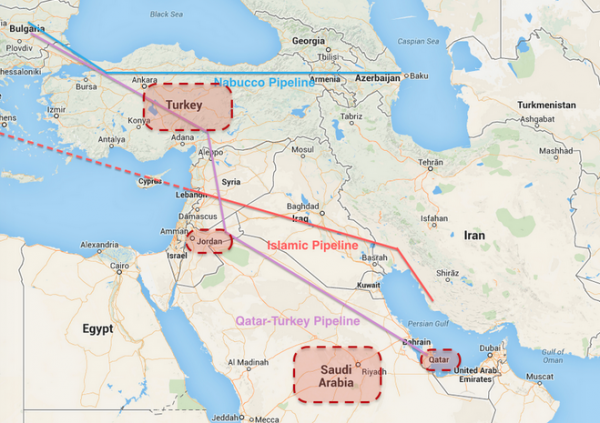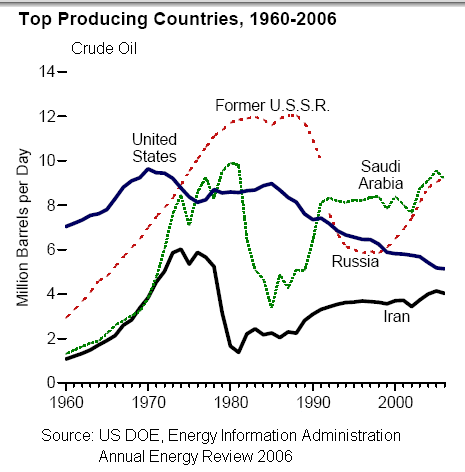RugozIran is a major oil producer.
Trust me, I've been aware for some time that Iran is a major oil producer, but how does that even play a role? When the revolution toppled the Shah, did the Iranians flock to Khomeini due to the amount of oil that their country produced? Did someone really think "well, normally I'd favor a liberal democracy, but given that our country produces a lot of oil I think a guardianship of the Islamic jurists is more appropriate"? You need to show a causation, not just correlation, though to be honest I don't see much correlation here either. Some of the most jihadist-infested places on the planet such are places like Afghanistan, southern Yemen, Somalia, and northern Nigeria - places which have no oil whatsoever.
I don't deny that the massive oil wealth possessed by the certain Islamist regimes helps them buy domestic stability and export their ideology abroad, but like I said, it is a secondary factor at best. Libya also has a massive oil wealth and it had developed a petro-welfare system which was intended to buy stability, just like the Saudis did. Libya was, in fact, one of the richest countries in Africa. And how did that work out for them exactly, tell me? Or what about Algeria? Not quite as wealthy as Libya, but still rather wealthy compared to most other Arab states and definitely oil-rich - how did Algeria fare in this matter? The only reason why nothing much happened in Algeria during the Arab Spring is because Algeria already had its Arab Spring, it had its bloody 10-year civil war against the Islamists that ended relatively recently - in 2002. So Algeria already "solved" its Islamist problem ahead of everyone else and the Islamists haven't had enough time to recover from that disaster. Yet the neighboring Kingdom of Morocco never had to deal with any of that, despite not having much oil and being much poorer than Algeria.
GandalfTheGreyYes but the point is that radical Islamism would have remained an irrelevant sideshow if not for the oil wealth - and certainly wouldn't have had the global reach it has today.
That might be, but I don't know how you can tell that. See my response to Rugoz right above. Neither the emergence nor preservation of the Islamist regimes seems to have had a whole lot to do with oil at the first glance.
starman2003While it's indisputable that Syria lost in '67, '73 and '82, all of those defeats could've been mitigated if not avoided, and Syria did not throw in the towel after any of them.
I'm not sure why any of this matters. Does it matter that Syria did not officially give up the fight, if it was pretty clear that the fight was lost? Arab Nationalism had visibly failed in Syria on every count. Syria did not succeed at liberating Palestine, it did not succeed at building an Arab nation-state, it did succeed at building Socialism, and it lost even more territory to Israel than what it had before the Arab Socialist Ba'ath Party came to power. When you experience a clear defeat and recovery doesn't seem likely in any near future, it doesn't matter very much whether or not you publicly admit it - everyone already knows it.
Israel has appeared unbeatable--most of the time--since at least 1967, yet baathist and other regimes maintained stability until quite recently.
First of all, how much have you even read about the history of Syria during that period? Syria experienced a violent Islamist uprising shortly after its defeat to Israel in 1973. The Islamist insurgency began in Syria in 1976 and ended after a massacre in Hama in 1982, and it had many hallmarks of a religious civil war. To say that it was "maintaining stability" during that period is a bit bizarre.
But you are right, of course, that the Arab-Israeli conflict is not completely settled, neo-colonialism and imperialism remains a factor, while secularism and socialism still retain some degree of popularity outside of minority groups. Which is why I'm by no means claiming that Arab Nationalism is completely dead. It is not. If it was dead, we would not have seen a counter-revolution in Egypt in 2013. If it was dead, it would be as destroyed and gone as Communism is in the former Soviet Union - not even the Communist Parties there honestly believe in it. It's not dead, and it was certainly one factor that helped Assad survive.
For example, I imagine that there were probably a lot of Sunnis and Syrians generally who were rather alienated from the rebels by the fact that the latter were being so openly buttressed by France and Turkey at the beginning, by the fact that the US and even Israel were seemingly throwing their support behind the rebels, and perhaps also by the fact that the only coherent economic policy that the rebels ever had was to advocate less government intervention in the economy. This must have helped Assad retain some Sunni support in major cities from Damascus to Aleppo. But man, the very fact that the rebels had managed to retain such strong support in the Sunni countryside
despite these factors should show you just how low their faith in Arab Nationalism have come. So to reiterate - no, I'm not saying that Arab Nationalism is completely dead, but it's taken a huge hit after its series of defeats in the 20th century, and this hit allowed other ideologies to start filling the void.
What saved him were his Iranian, Hez and Russian supporters.
...which is an absolutely meaningless statement given that the rebels have also received plentiful of foreign support until recently, and in some areas (like north Aleppo) still obviously do.




















 Deluded as the necons were, as the grotesque consequences showed, the idea of democratization began to spread, just like the morons thought it would...The result was a descent into gory chaos, as disaffected people in Tunisia, Egypt, Libya, Syria and Iraq turned against their governments. Had Saddam been left alone, not only Iraq but the while region would've remained much more stable.
Deluded as the necons were, as the grotesque consequences showed, the idea of democratization began to spread, just like the morons thought it would...The result was a descent into gory chaos, as disaffected people in Tunisia, Egypt, Libya, Syria and Iraq turned against their governments. Had Saddam been left alone, not only Iraq but the while region would've remained much more stable.

 The left and their Muslim loving fascist allies really do live in a fantasy world. The last thing the Baath party bought to Syria or Iraq was stability. Try looking at a bit of history and then you might refrain from making these ridiculous assertions. Under the Baathist watches we had 2 direct wars with Israel, the Lebanese civil war, the Iran - Iraq war, the invasion of Kuwait, various Syrian backed terrorist attacks, the backing of Hamas, the execution of a third of the Iraq Baath parties leadership, wars with the Kurds, war between Kurdish groups and Syrian backing for various anti western so called terrorist attacks, including Panam 103 which later got blamed on Gadaffi.
The left and their Muslim loving fascist allies really do live in a fantasy world. The last thing the Baath party bought to Syria or Iraq was stability. Try looking at a bit of history and then you might refrain from making these ridiculous assertions. Under the Baathist watches we had 2 direct wars with Israel, the Lebanese civil war, the Iran - Iraq war, the invasion of Kuwait, various Syrian backed terrorist attacks, the backing of Hamas, the execution of a third of the Iraq Baath parties leadership, wars with the Kurds, war between Kurdish groups and Syrian backing for various anti western so called terrorist attacks, including Panam 103 which later got blamed on Gadaffi. - By wat0n
- By wat0n